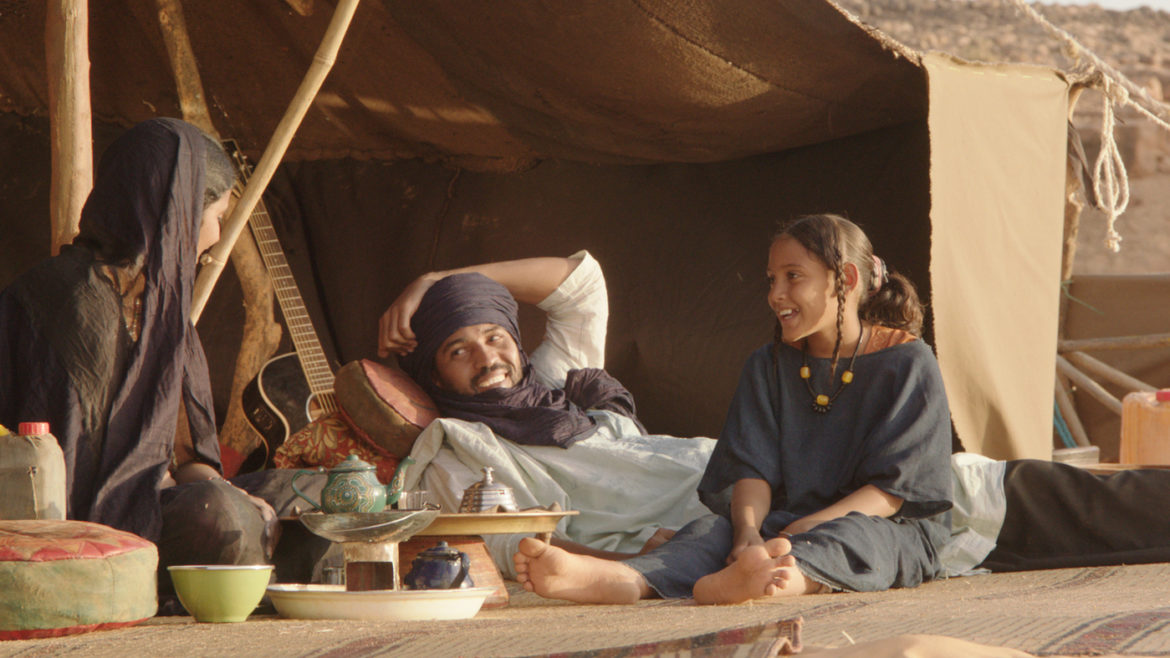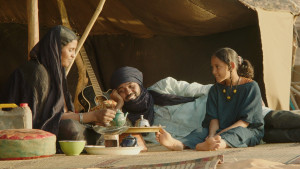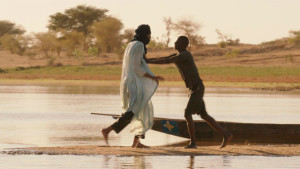The sand seems to stretch forever under cloudless skies, and time is marked by routine – herding cattle, relaxing with family under the humble shelter of a lean-to style tent, discussing the future, drinking tea. Timbuktu’s first half hour or so is a slow, quiet portrait of desert life in Mali; if it’s not exactly paradise, what with the sand whipping around and garments covering faces to protect them from the elements, it’s not too far from it, either. But things are changing, and not for the better.
Kidane (Ibrahim Ahmed) and his wife Satima (Toulou Kiki) are the last of their neighbors in the remote region, all the others having moved on after sensing the dangers of the new fundamentalists who are trying to bring foreign notions of Shari’a law to the region. They, their daughter Toya (Layla Walet Mohamed), and the young shepherd Issan (Mehdi A.G. Mohamed) are stubbornly holding on to the life they’ve known. Kidane, in particular, is tired of running. Do they not recognize the extent of the danger, or simply refuse to knuckle under to these self-important, pious clowns who believe they and they alone understand God’s will?
So begins the harrowing journey of Timbuktu, gorgeously directed by Abderrahmane Sissako and filled to bursting with nuanced performances by everyone involved. Mauritania’s submission for the 2015 Academy Awards, Timbuktu begins as farce, almost playful, and ends in the bleakest of tragedies. It’s spellbinding and deeply, deeply sad.
The transition between its two modes is so graceful and fluid that, like the characters, you only gradually noticed the way in which horror is impinging on this place. At the film’s start, Timbuktu is a place out of time, and the fundamentalists are absurd figures viewed with bemused detachment by the local Bedouins and others. The edicts – woman are to wear gloves even when selling fish, the length of men’s pants are rigidly monitored, and so forth – are absurd, and greeted as such. “All my pants are like this,” one man notes, upon being told they are unacceptable. Of course, this can’t last.
As things escalate, Sissako constructs some amazing images and sequences. After soccer is banned by the zealots, the kids pantomime a game without a ball, passing, shooting, and cheering their phantom goals and stops. It’s a small act of defiance but a desperate attempt to circumvent the draconian rules being placed on them. The image itself suggests that no amount of stricture can kill the imagination or the desire for freedom, and it throws into stark relief the absurdity of fundamentalism.
Such moments are quickly becoming a thing of the past. After Kidane runs into trouble with a neighboring fisherman, he falls into the clutches of the would-be regime. At this point, Timbuktu becomes decidedly darker. The absurdist touches shift to a palpable sense of terror – these men, bent on the subjugation of women and the imposition of irrational order, are no longer to be laughed at or shrugged off. As sham trials escalate – refusing gloves, singing and playing music, being unaccompanied with a man, any number of minor infractions – it becomes clear that joy itself is under attack. There’s no room for it in this vision of the world, sent down from on high (no matter what the local cleric says). Power will be enforced, and brutally.
Along with some utterly beautiful framing (a long shot of two men struggling recalls Lawrence of Arabia), Sissako’s best decision is to refrain from sermonizing or shouting, neither of which would have a place here.
Timbuktu is a resolutely quiet film about encroaching evil, and by immersing us in all of the absurdities and sorrows of its characters’ world, the emotional payoff is heightened enormously. Some scenes take a long time to play out because conversations must be translated between Arabic, the local dialect, French, and sometimes English – the colonial past is never far from our mind, and the legacies of power are showcased by the difficulty of communication.
The one misstep – Abel Jafri’s militia leader Abdelkerim smokes cigarettes, despite their ban, a too on-the-nose depiction of hypocrisy – does nothing to overshadow the subtly of the rest. Timbuktu is a film intended to outrage, but in the quietest way possible. What starts as farce ends in tragedy, and you walk away amazed, again, at both the cruelty of humans and our resiliency.
Towards the end, we watch Toya run, breathless, through the desert, a small girl trying to outpace the guns of a false god. Here’s hoping she makes it. Here’s hoping we all do.



